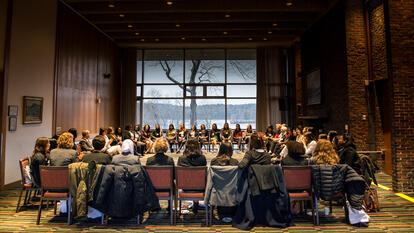Get Up and Grow: Environmental Studies Professor Discusses Garlic Mustard Research

This article, by Lisa Scanlon Mogolov ’99, originally appeared in the winter 2019 issue of Wellesley magazine. Find this story and more on the magazine’s website.
Alden Griffith, assistant professor of environmental studies, has taught at Wellesley since 2008, when he was the botany fellow in the Wellesley College Botanic Gardens. We spoke with Griffith about his large-scale field experiment throughout New England on the aggressive invasive plant species Alliaria petiolata (garlic mustard).
Why garlic mustard?
It invades forest understories, so it’s an herb that can become really dominant inside forests. And what we’re doing is trying to not only ask questions about this particular species…but also to use it to address ecological theory and thinking about, how does the environment influence the ability of plant populations to persist or fail.
What kind of data are you gathering?
We’re trying to figure out what happens to individual plants, and ask how does that then scale up to what happens to the population. By doing that, we get lots of insight in terms of how populations change, and what’s driving it. We’re linking that to environmental factors like soil nutrients, forms of available nitrogen and pH, soil moisture, and light availability. So all of that ties into what’s known as ecological niche theory, this idea that you’ve got all these different factors that allow where a species can persist.
How do you track individual plants?
We use these little plastic toothpicks, or technically, party picks, that I buy thousands of. … We choose up to 10 individuals per plot to mark, and in the first round, we measured over 1,700 plants.
How is Global Flora, the College’s new greenhouse scheduled to open this spring, going to affect your work?
It’s going to be so cool. Global Flora, it’s just not plants in pots. It’s plants in the ground. It’s these ecosystems. It’s awesome. We can do all sorts of experiments and studies, not only to ask interesting questions and tie that into coursework and labs, but we can also train and familiarize students with the methodologies of how we do this. And we can do it in February.
We’ve seen you around campus with other faculty, playing guitar. What are your favorite songs to play?
We have a joke that we have a lot of home songs. So “Old Home Place,” “On My Way Back to the Old Home,” “Gone Home.” So there’s a bunch of bluegrass/folky/Appalachia kind of music.



